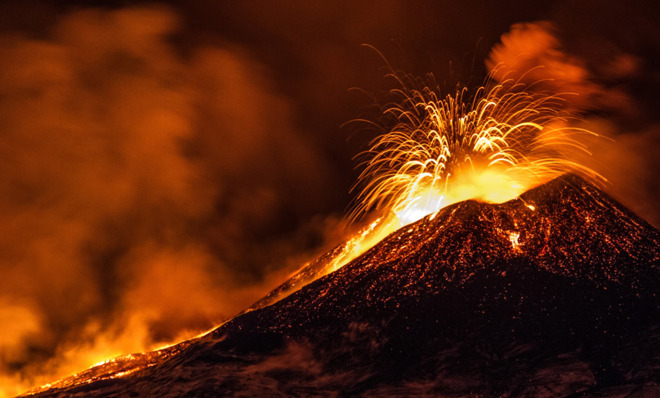Don't sweat the supervolcanoes
Sensationalistic reports about an imminent eruption at Yellowstone distract from the real threats humanity faces

A free daily email with the biggest news stories of the day – and the best features from TheWeek.com
You are now subscribed
Your newsletter sign-up was successful
Beneath Yellowstone National Park is a huge chamber of magma, which by some measures makes the park's volcano the world’s largest. The last three eruptions at Yellowstone occurred 2.1 million, 1.3 million, and 640,000 years ago, respectively.
Scientists estimate that another mega-eruption — which would send billions of cubic meters of choking ash up to 15 miles in the air, blackening the skies and drastically changing the climate — could possibly occur in the next 100,000 years. Such an event would present a huge danger to human civilization — killing millions in the initial blast, and then disrupting agriculture, infrastructure, and the global economy for many years to come.
Of course, the next 100,000 years is a very long timeframe. But some speculate that an eruption at Yellowstone could occur much sooner. This video — in which bison at Yellowstone appear to be fleeing an imminent disaster — went viral in the last week on news that Yellowstone had experienced its strongest earthquake since 1980:
The Week
Escape your echo chamber. Get the facts behind the news, plus analysis from multiple perspectives.

Sign up for The Week's Free Newsletters
From our morning news briefing to a weekly Good News Newsletter, get the best of The Week delivered directly to your inbox.
From our morning news briefing to a weekly Good News Newsletter, get the best of The Week delivered directly to your inbox.
Some claim this behavior could foreshadow an eruption, noting that there were similar reports of frantic animal evacuations preceding the 2006 Asian tsunami. But this time around, there's probably a simpler explanation. The chief of public affairs for Yellowstone, Al Nash, released a video on the subject giving some context to the viral bison video:
We do have bison, elk and other animals that have moved outside the park recently, but they're doing that because it's the depth of winter, food is a little hard to find in places inside Yellowstone, and they tend to migrate at this time of the winter outside the park to lower elevations where they think there might be something to eat that's easier to get at. When the snow melts off and things start to green up, those very same animals will walk right back into the park. [YouTube]
He concludes, "We have seen no signs to suggest that the Yellowstone volcano is about to erupt."
What signs would we see if Yellowstone were about to erupt? If we were moving toward a massive geological event, then we should see massive geological signs of change. We could expect large earthquakes as opposed to the small rumble we saw last week, which registered a humble 4.9 on the Richter scale. We should also see the earth around the volcano swelling by tens or hundreds of meters, as opposed to the centimeters of uplift we see regularly.
But for the sake of it, let’s assume Yellowstone will erupt tomorrow. Could we do anything about it? Although some scientists are experimenting with the idea, to date there have been no successful efforts to stop or reduce a volcanic eruption. These kinds of geological events remain stubbornly outside human control even on the smallest scale — and Yellowstone is absolutely the largest scale.
A free daily email with the biggest news stories of the day – and the best features from TheWeek.com
If Yellowstone blows in 10,000 or 50,000 years, maybe technology will have been developed to mitigate or contain its effects. But if it unexpectedly blows tomorrow, we can do nothing whatever to stop it. At best, with warning signs, we could conduct an evacuation from the surrounding area.
Humanity has survived two supervolcano blasts in the past 100,000 years — the Lake Taupo blast in New Zealand 26,500 years ago, and the Lake Toba eruption in Indonesia 74,000 years ago. Although these blasts made life pretty difficult for humans — up to 60 percent of the global human population may have been wiped out by the Toba blast — our huge numbers, ingenuity, and technological advances would probably allow us to make it through an unexpected supervolcanic blast.
But what makes worrying about unlikely and unpreventable cataclysms like Yellowstone illogical is that there are lots and lots of other dangers to humanity — like climate change resulting from human carbon emissions into the atmosphere — that we know are actually happening. And unlike supervolcanoes, we can take action to reduce the risk of climate change destroying human civilization as we know it.
Editor's note: This article has been revised since it was first published in order to more clearly include proper attribution to source material.
John Aziz is the economics and business correspondent at TheWeek.com. He is also an associate editor at Pieria.co.uk. Previously his work has appeared on Business Insider, Zero Hedge, and Noahpinion.
-
 Tourangelle-style pork with prunes recipe
Tourangelle-style pork with prunes recipeThe Week Recommends This traditional, rustic dish is a French classic
-
 The Epstein files: glimpses of a deeply disturbing world
The Epstein files: glimpses of a deeply disturbing worldIn the Spotlight Trove of released documents paint a picture of depravity and privilege in which men hold the cards, and women are powerless or peripheral
-
 Jeff Bezos: cutting the legs off The Washington Post
Jeff Bezos: cutting the legs off The Washington PostIn the Spotlight A stalwart of American journalism is a shadow of itself after swingeing cuts by its billionaire owner